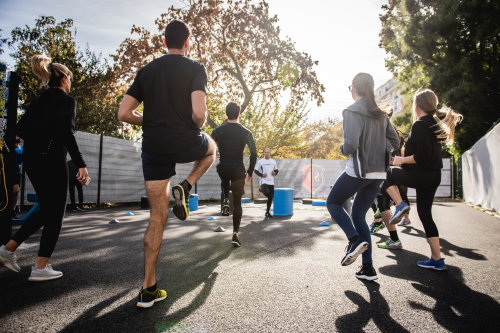Just because you’re walking doesn’t mean you’re taking the easy way out. In fact, walking is an excellent workout and can help you get in shape and meet your fitness goals. Walking’s gentle nature may lead you to mistakenly think that additional supplements are not needed, but indeed, they could help you get more from your walking workouts.
How Powerful is Walking?
BREAKING: 1 Cup of This Melts Belly and Arm Fat (Take Before Bed)
Walking is no joke when it comes to workouts and burning calories. Depending on how briskly you walk, you can burn anywhere from 200 to 350 calories per hour, more if you really step on it. That can equate to a half pound of body fat burned off every five days.
If you want to boost the calorie-burning power of your walks, try doing it in intervals: walk very fast for 30 seconds and then slow it down for the next minute and a half. Continue repeating this sequence throughout your walk for maximum fat burning.
Besides the excellent calorie burn walking provides, it’s extra gentle on the body and is often found to be much more enjoyable than other forms of cardiovascular exercise. You can do it anywhere, anytime, with anyone. It’s really the ultimate exercise. But in order to get the maximum benefits out of your walking program, be sure to fuel up properly with healthy whole natural foods and consider adding the right walking workout supplements.
Best supplements for Walking
1. B Vitamins
B vitamins are associated with energy levels and stamina, and that is certainly something you want if you’re going to be out hiking or walking a good distance. Because they help your body break down proteins and fats, the energy boost you experience is just what you need for some long walks and for losing excess body fat. There are actually eight B vitamins:
- Thiamin (vitamin B1)—this vitamin helps your body break down carbohydrates into useable energy. It also helps your body produce necessary hormones.
- Riboflavin (vitamin B2)—this B vitamin helps your body produce energy and assists in the breakdown of fats. It also helps convert substances into useable nutrients the body needs.
- Niacin (vitamin B3)—niacin is important for the synthesis of carbohydrates into a form of energy the body can use. It also helps protect against damage to DNA.
- Pantothenic Acid (vitamin B5)—part of the energy and metabolism process, pantothenic acid helps create and process coenzymes.
- Pyridoxine (vitamin B6)—this vitamin again aids in the breakdown of food into a useable form for the body. It’s also important for proper brain function and to support your immune system.
- Biotin (vitamin B7)—this vitamin helps regulate DNA and supports communication between cells in the body. It’s also great for strengthening hair and nails.
- Folate (vitamin B9)—this vitamin aids in the synthesis of vitamins and amino acids and ensures that correct DNA replication occurs.
- Cobalamin (vitamin B12)—perhaps one of the most well-known of the B vitamins is vitamin B12. While this is available in pill form, some people get vitamin B12 injections to help boost their energy levels. This vitamin helps you process fat and protein and helps to create new red blood cells. If you don’t get enough B12, you can feel lethargic, depressed, experience constipation, weight loss, and even tingling in your extremities.
2. Calcium & Vitamin D
Calcium and vitamin D work together to build your bone strength. Because walking places repeated force on the body and, in particular, your bones, ensuring you give them the support they need is critical if you want to avoid unnecessary breaks and stress fractures.
3. Iron
While iron may not be the first supplement that comes to mind, it’s actually quite important for athletic performance. Iron is part of a protein called hemoglobin that helps your blood shuttle oxygen to your muscles when you’re exercising. Also important, iron helps to gather carbon dioxide and direct it back to the lungs so the body can dispose of it. Without proper iron levels, your body will be at a major disadvantage when it comes to walking or any other kind of physical activity. However, before adding any iron supplements to your diet, it’s crucial to ensure you are deficient as high levels of iron can also lead to problems.
4. Electrolytes
Electrolytes are minerals with positive and negative charges when dissolved in water that assist your body in a variety of processes. There are a number of them:
- Sodium
- Potassium
- Chloride
- Calcium
- Magnesium
- Phosphate
- Bicarbonate
They are needed to help keep your body’s water level and pH levels in balance. They are also needed to help your muscles contract. Additionally, electrolytes carry nerve impulses to the heart, nerves, and other muscles. Taking in enough electrolytes is essential, especially if you are working up a sweat while walking or if you drink a lot of water.
5. L-citrulline
This amino acid helps your body flush out toxins and promotes better circulation by helping your blood vessels expand. This may help improve athletic performance over time and may help flush blood more easily into your muscles as you walk.
6. Turmeric
Turmeric is a great supplement to add to your regimen as it may help support healthy inflammation in the body, which is important as the repetitive impact of walking can lead to greater inflammation. Turmeric also may help support detoxification and joint health, which are important when you’re constantly on the move.
7. Beet Juice
TRENDING: Doctors Can't Believe She Used This To Erase Her Wrinkles...
Beet juice is another great addition to your walking supplement repertoire. It helps your body change nitrates into what’s called nitric oxide. Nitric oxide in turn may help increase blood flow, lower blood pressure, and bump up your endurance so you can walk faster and further.
8. Caffeine
Caffeine may have gotten a bad rap over time but it’s actually quite useful when added to your workout routine. It promotes thermogenesis, meaning it raises your body temperature so you can burn more calories (and thus, more body fat). It may also give you that extra boost in power you need to push your walking workout to the next level.









